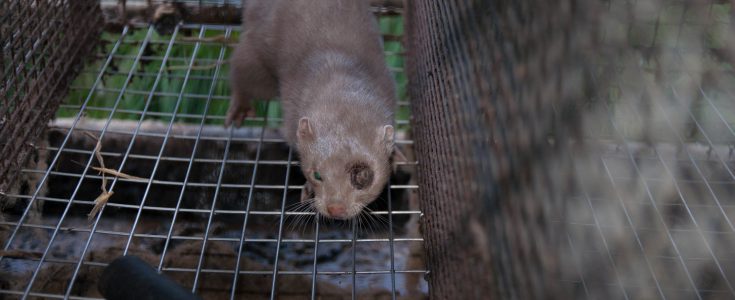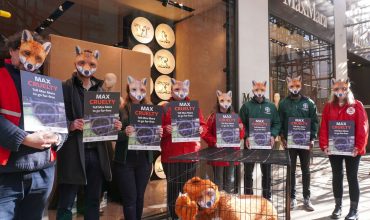The story shows that Canada is ripe for a comprehensive fur farming ban.
A mink fur factory farm in Prince Edward Island, Canada that received $4 million in loans from the provincial government is in receivership, with taxpayers set to lose huge sums of money.
At one point in 2016, the company had more than 80,000 mink, according to court documents. In what is an embarrassing misuse of public funds, a 2014 loan from the government was handed over, to be used to expand operations, which included starting a new farm. In January 2018, a tender went out for assets connected to Silver Hill Fur Farm and the government is still owed a huge $3,969,013 of the $4 million loan.
This is a damning indictment of the fur industry and another example of why taxpayer money should not be used to prop up one of the world’s most inhumane industries.
Fur factory farming is currently being comprehensively exposed in Canada.
Kitchener Ontario Animal Liberation Alliance recently conducted a month long undercover investigation into the Ontario fur industry and has produced footage which yet again highlighted the inherent cruelty and appalling conditions of fur factory farms.
The video footage and photos taken depict mink living in torturous conditions. Sludge pits filled with urine, faeces, and maggots were releasing poison gas just below the animal enclosures – putting the animals at risk of lung and eye infections.
The disposal of waste and manure from Ontario mink farms is not regulated by government and is often simply dumped into the environment. Recently manure run off from Nova Scotia mink farms was responsible for the destruction of several waterways, which experts say may never recover.
Malcolm Klimowicz from Kitchener Ontario Animal Liberation Alliance said the following about his investigation:
“Mink are aquatic animals. In the wild these small but noble creatures will roam up to 5 km a day and spend two thirds of their time in the water swimming and hunting. In captivity, the forced restrictions of their natural behaviours leads to frustration, distress, and abnormal repetitive behaviours.
There is no mental stimulation. Just long periods of inactivity and frustration. This type of captivity is a form of psychological torture. I witnessed animals repeatedly pacing back and forth and biting their cages.
I wondered what was going through their minds. They were literally going insane right in front of my eyes. Their spirits were crushed. If people knew this is where fur came from, most people wouldn’t wear it but the fur industry keeps lying to the public and hiding the truth.”
“Causing animals to be in a state of distress is a crime under the OPSCA Act but as you can see it isn’t being enforced.”
“This is the big elephant in the room for the fur trade. What no one is willing to discuss. Even though this mink facility was state of the art and was equipped with cooling system, bigger cages, and waste management, the animals were still suffering. Being driven mad from confinement. There is no humane way to keep these animals captive without inflicting mental trauma and psychological damage. This is animal cruelty and it’s happening on Ontario fur farms right now.”
It is clear that the Canadian fur factory industry is financial unviable and a disastrous failure for animals, unable to meet even the most basic standards of animal welfare. Respect for Animals hopes that Canada soon joins the UK and many other countries by introducing a fur farm ban, once and for all.




